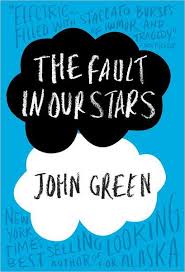 From time to time I feature guest posts from thoughtful people. It seems appropriate that a reflection on the movie about young people, The Fault in Our Stars, come from a young woman who has already written so thoughtfully about love and loss. Today’s post is from Linnea Peterson who is a 2014 graduate of Central High School in Saint Paul, Minnesota and plans to attend Luther College in Decorah, Iowa in the fall. She has been active in most imaginable nerdy extracurricular activities throughout junior high and high school, in addition to singing in choirs at church and school. She is passionate about economics, literature, and languages, speaking Swedish and Spanish in addition to her native English. Linnea’s mom is my friend and colleague Deanna Thompson, author of Hoping for More: Having Cancer, Talking Faith, and Accepting Grace.
From time to time I feature guest posts from thoughtful people. It seems appropriate that a reflection on the movie about young people, The Fault in Our Stars, come from a young woman who has already written so thoughtfully about love and loss. Today’s post is from Linnea Peterson who is a 2014 graduate of Central High School in Saint Paul, Minnesota and plans to attend Luther College in Decorah, Iowa in the fall. She has been active in most imaginable nerdy extracurricular activities throughout junior high and high school, in addition to singing in choirs at church and school. She is passionate about economics, literature, and languages, speaking Swedish and Spanish in addition to her native English. Linnea’s mom is my friend and colleague Deanna Thompson, author of Hoping for More: Having Cancer, Talking Faith, and Accepting Grace.
Last week marked the premier of the movie adaptation of The Fault in Our Stars, originally a bestselling young adult novel by John Green. Using the tagline “one sick love story,” it tells of the romance between teenagers Hazel Grace Lancaster and Augustus Waters, both of whom have cancer. Hazel and Augustus are both classic Green characters: witty, sarcastic, intelligent, and philosophical. In the movie adaptation, they are brilliantly portrayed by Shailene Woodley and Ansel Elgort, respectively. Ben Richardson’s masterful cinematography helps the unique story soar on the silver screen with all its original poignancy and humor.
Any story with a terminally ill narrator is bound to raise metaphysical questions, and The Fault in Our Stars is no exception. Hazel’s voice-over narration and sardonic dialogue reveal her deep skepticism about nearly everything early on, so it’s no surprise when she tells Augustus that she believes in neither God nor angels and is disinclined to believe in an afterlife. What’s much less expected is Augustus’s response; while he is uncertain exactly what he believes, he confidently asserts that he “believes in something.” Augustus often seems to be cut of the same cloth as Hazel, so juxtaposing his open agnosticism with her adamant unbelief proves to Hazel—and to the audience—that being intelligent and teenaged and skeptical doesn’t have to lead to atheism.
Hazel’s newfound receptiveness to belief is both challenged and emphasized when she and Augustus meet Peter van Houten, a novelist whom Hazel has admired for years. Van Houten is intensely nihilistic, and his absolute refusal to believe in anything allows him to serve as a foil for the newly questioning Hazel, who rejects his pessimistic worldview. In many ways, van Houten sounds like Hazel did at the beginning of the movie, too skeptical to give any idea a fair trial, but now Hazel, having been exposed to Augustus’s belief, refuses to agree with van Houten.
 Organized religion, in the form of Christianity, plays a minor role in The Fault in Our Stars. Hazel and Augustus meet in a church at a support group meeting for teenagers with cancer. The support group leader, Patrick, in many ways resembles a youth pastor, which is a large part of the reason that Hazel does not have much regard for him. He’s all songs and little substance, and his optimism would be more appropriate at a Bible camp than at a gathering of youth suffering from life-threatening illnesses. After Patrick’s cameo at the beginning of the movie, religion does not reappear until the funeral toward the movie’s end, at which point a pastor reads Psalm 23 and gives a short eulogy. He speaks decently, and it’s probably the best he could do to memorialize a young cancer patient he did not know personally. But that’s part of the problem—there is no personal attachment, and so the pastor’s words, however well-put or well-meant, could never be as comforting as what Hazel, Augustus, and their friend and fellow patient Isaac have constructed together over the course of their intimate and tragic acquaintance.
Organized religion, in the form of Christianity, plays a minor role in The Fault in Our Stars. Hazel and Augustus meet in a church at a support group meeting for teenagers with cancer. The support group leader, Patrick, in many ways resembles a youth pastor, which is a large part of the reason that Hazel does not have much regard for him. He’s all songs and little substance, and his optimism would be more appropriate at a Bible camp than at a gathering of youth suffering from life-threatening illnesses. After Patrick’s cameo at the beginning of the movie, religion does not reappear until the funeral toward the movie’s end, at which point a pastor reads Psalm 23 and gives a short eulogy. He speaks decently, and it’s probably the best he could do to memorialize a young cancer patient he did not know personally. But that’s part of the problem—there is no personal attachment, and so the pastor’s words, however well-put or well-meant, could never be as comforting as what Hazel, Augustus, and their friend and fellow patient Isaac have constructed together over the course of their intimate and tragic acquaintance.
Rather than religion, Hazel relies on philosophy throughout most of The Fault in Our Stars. She appreciates Kantor and Magritte, and she comforts herself by recalling the theory that some infinities are bigger than other infinities, and telling herself that the infinity which she and Augustus have shared has been beautiful and genuinely infinite, if too short. After this love affair with philosophy, however, Hazel refuses to listen to Peter van Houten when he appears unexpectedly in America and attempts to lecture her on philosophy.
This refusal highlights that the content of a message matters much less than the receiver’s opinion of its deliverer. An interesting discussion of philosophy, coming from a known jerk, is not worth hearing; likewise, from Hazel’s perspective, a well-meant eulogy from an unfamiliar pastor must be devoid of insight. This leaves the church in a catch-22. For youth who have never been a part of the church, any message religion has to offer is suspect on the simple grounds of its alienness—what could this institution possibly have to say about my life? What could it know that would be relevant to me, since it has had no previous contact with me?
Religion has often been most relevant in times of suffering, so its near-absence from Hazel and Augustus’s post-diagnosis lives reveals a generation—or, at least, a substantial part of a generation—that does not feel the need to call upon the church for anything. Ultimately, it is difficult to fault Hazel, Augustus, and Isaac for the secular ways in which they make peace with their circumstances, or to pinpoint the exact moment in their journey when faith or religion would have been a better solution than the one they devised on their own. In classic John Green fashion, the teenaged main characters find truth and comfort in literature, math, science, and (most of the time) philosophy. They find respite in togetherness, sarcasm, and video games that distract them from reality. While it is possible to say that all of these forms of comfort either pale in the face of faith or could be augmented by it, it is also the case that everyone who suffers is making up coping mechanisms on the fly, and managing to find something that works is rare enough that we criticize those with “unfaithful” survival strategies from a position of unsympathetic privilege. If the church is to recapture this generation, it must articulate why faith in God offers more than any human being could—a taller order than usual when Hazel and Augustus are the human beings offered up for comparison.












